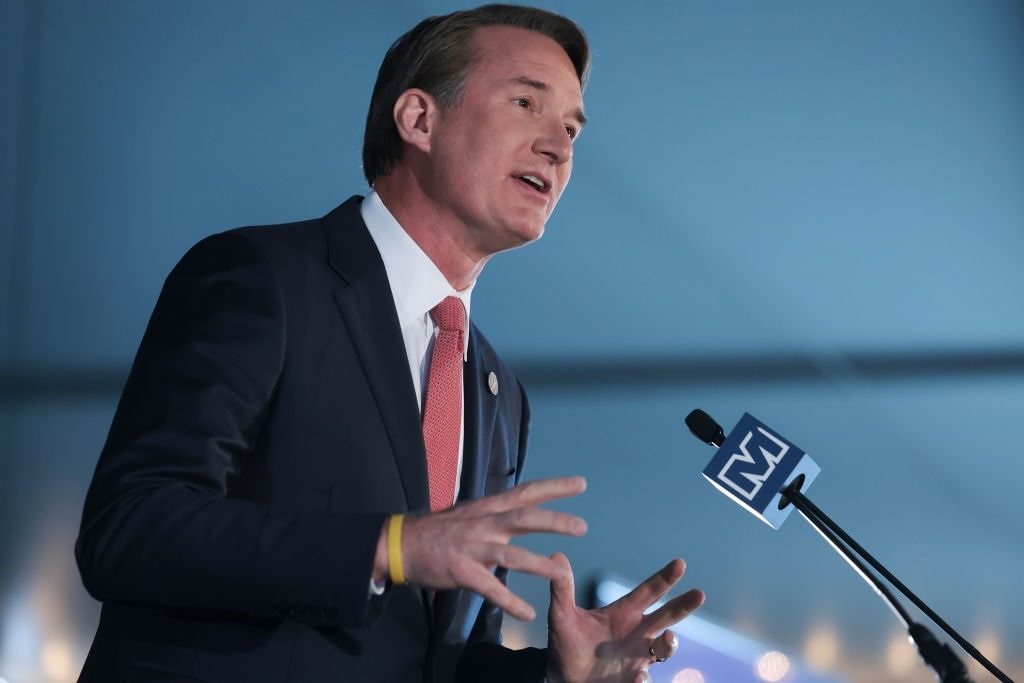Virginia Governor Glenn Youngkin has vetoed more bills than any of his predecessors – and he isn’t done yet. Much to the ire of Democrats, who have controlled both chambers of the state legislature since Youngkin took office, bills aimed at advancing gun control, abortion access protections, and environmentalism have all fallen before the power of Youngkin’s pen. He’s the undisputed veto king of Virginia. And as comedy great Mel Brooks said in his 1981 History of the World, it’s good to be the king.
Legislation and the Veto in Virginia
The state legislature of Virginia is made up of the 100-seat House of Delegates and the 40-seat Senate. Regular bills pass the combined General Assembly by majority votes, though what constitutes a majority differs slightly from one chamber to the next.
 In the House, a simple majority – meaning more than half of those present – passes most bills as long as that number doesn’t fall below 40. So, if all 100 members are present and voting, then a simple majority is 51. If, however, only 90 show up, just 46 constitutes a majority. But no matter how few are present and voting, no legislation-passing majority can fall below 40.
In the House, a simple majority – meaning more than half of those present – passes most bills as long as that number doesn’t fall below 40. So, if all 100 members are present and voting, then a simple majority is 51. If, however, only 90 show up, just 46 constitutes a majority. But no matter how few are present and voting, no legislation-passing majority can fall below 40.
The Senate is different. There, a bill must win a “constitutional majority,” or a majority of those elected, regardless of how many are present and voting. In the 40-seat chamber, that’s always going to be 21.
Assuming a bill achieves the required majority in both chambers of the General Assembly, it then goes on to the governor, who can either sign it into law, ignore it into law (bills become law after seven days if the governor doesn’t act on them), send it back with specific amendment suggestions, or reject it entirely. Should a bill go back to the legislature for revision, it becomes law once both houses agree by majority vote on the changes suggested by the governor. If, however, lawmakers want to force passage of a bill in its original form despite a governor’s veto or request for changes, it requires a two-thirds vote of all members present in both chambers – that’s 67 in the House if all the delegates show up and 27 in the Senate.
Overriding a veto is a rare feat. Of the 254 vetoes in Virginia tracked by Ballotpedia from 2010 to 2020, only two (0.8%) were overridden. And since the Senate has not seen a two-third majority in one party in well over 30 years (though the House has three times in that same span) it’s safe to assume those few that are overturned represent strongly bipartisan legislation.
It’s Good to Be the King
When a governor kills a bill, it tends to stay dead. Back in 2017, Democrat Terry McAuliffe broke the state record for vetoes after signing his 91st. McAuliffe, who presided over a GOP-controlled General Assembly, had a total of 120 vetoes by the time he was done – not surprising, given the partisan division we tend to see in American politics. What might come as a shock to some is that the previous record holder, Jim Gilmore, was a Republican leading a GOP trifecta!
The next time a Virginia governor found himself in McAuliffe’s position was in 2023, when Glenn Youngkin took the job with a Democrat-controlled House and Senate – and he did not let the opportunity to break a record go to waste. Youngkin surpassed McAuliffe’s entire four-year term in his first year, vetoing 153 bills. So far, about halfway through his term, the total is up to 194.
Just this month, Gov. Youngkin has vetoed civil penalties for sellers of invasive plants, a bill granting college and university faculty authority to request district court eviction records, an attempt to create a prescription drug affordability board, and a requirement for the state to model public education policies on climate change and “environmental literacy.” Most recently, he vetoed a Democrat-sponsored bill that would have otherwise transitioned the state to the ranked choice voting model.
With the current House and Senate split in favor of Democrats 51-49 and 21-19, respectively, the chances of overturning a veto by Youngkin this session are slim indeed. It really is good to be the king.




